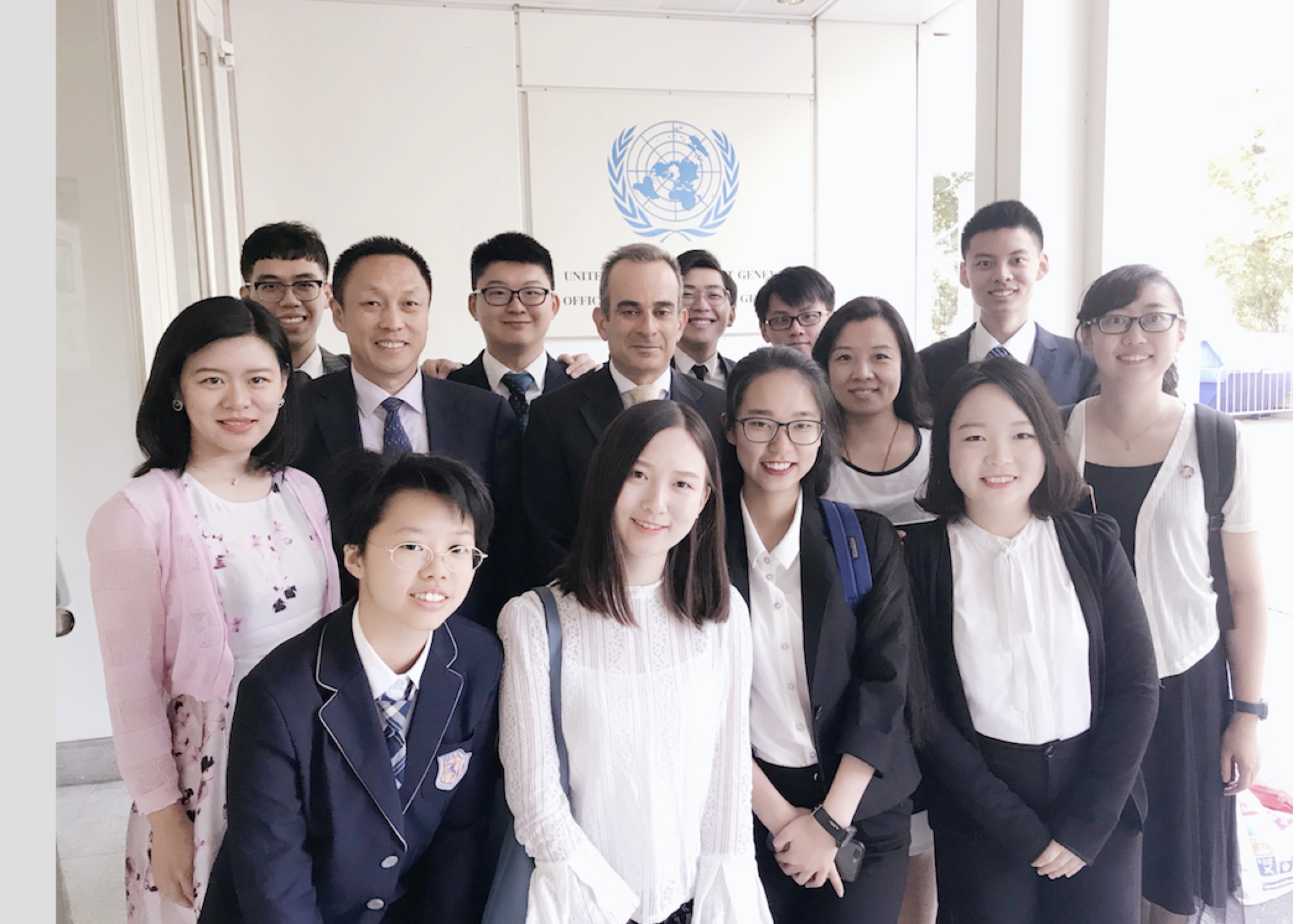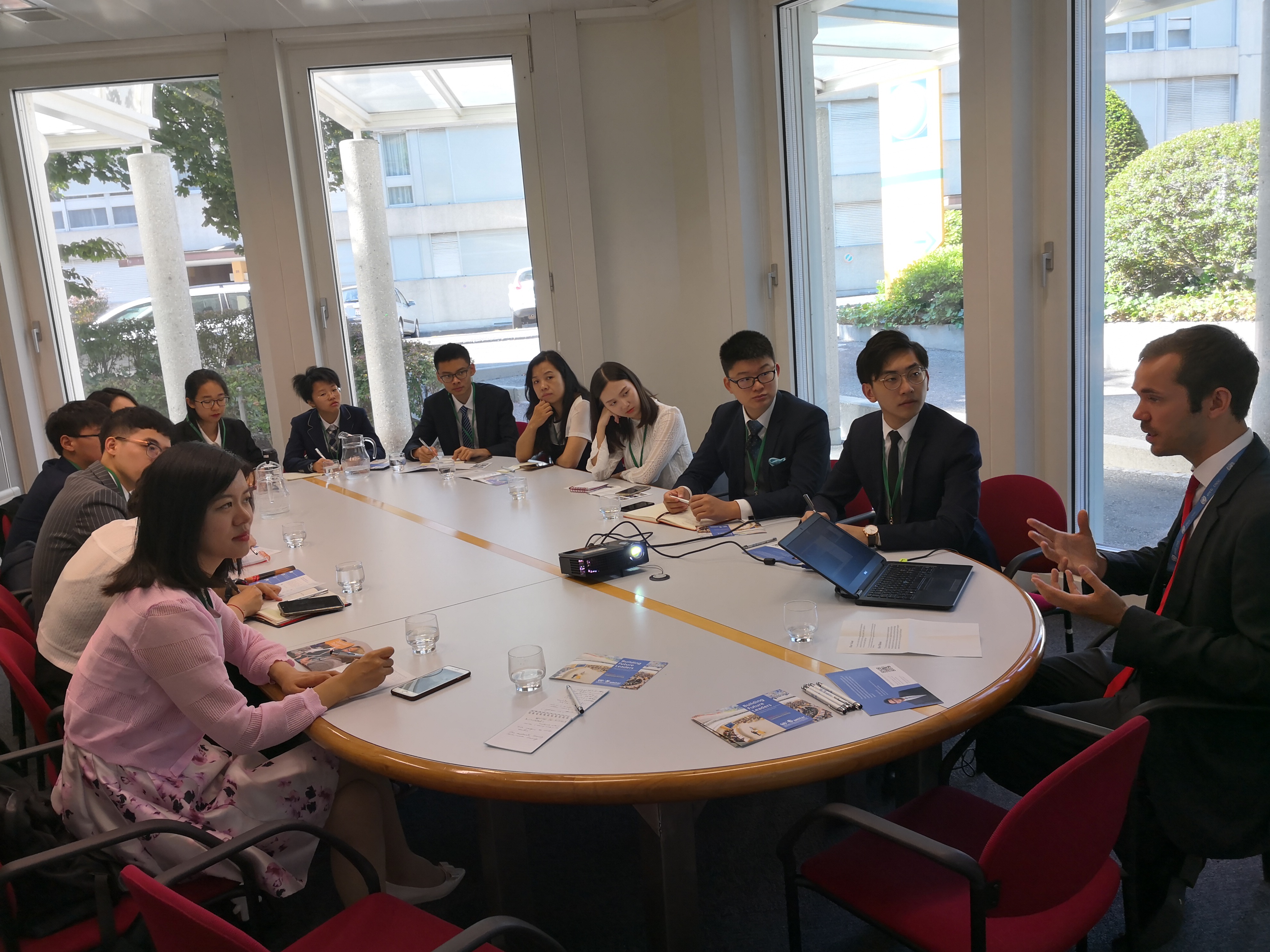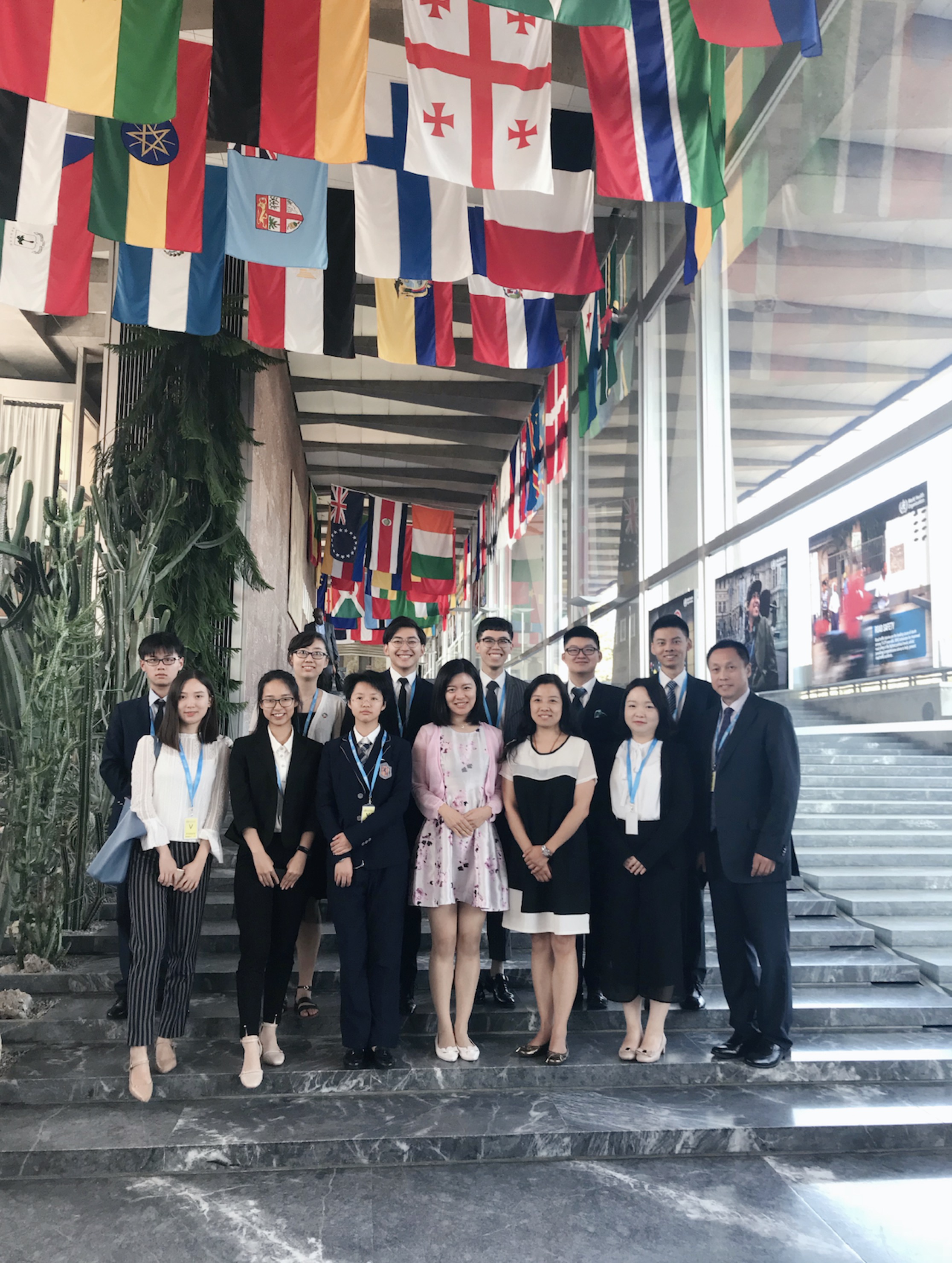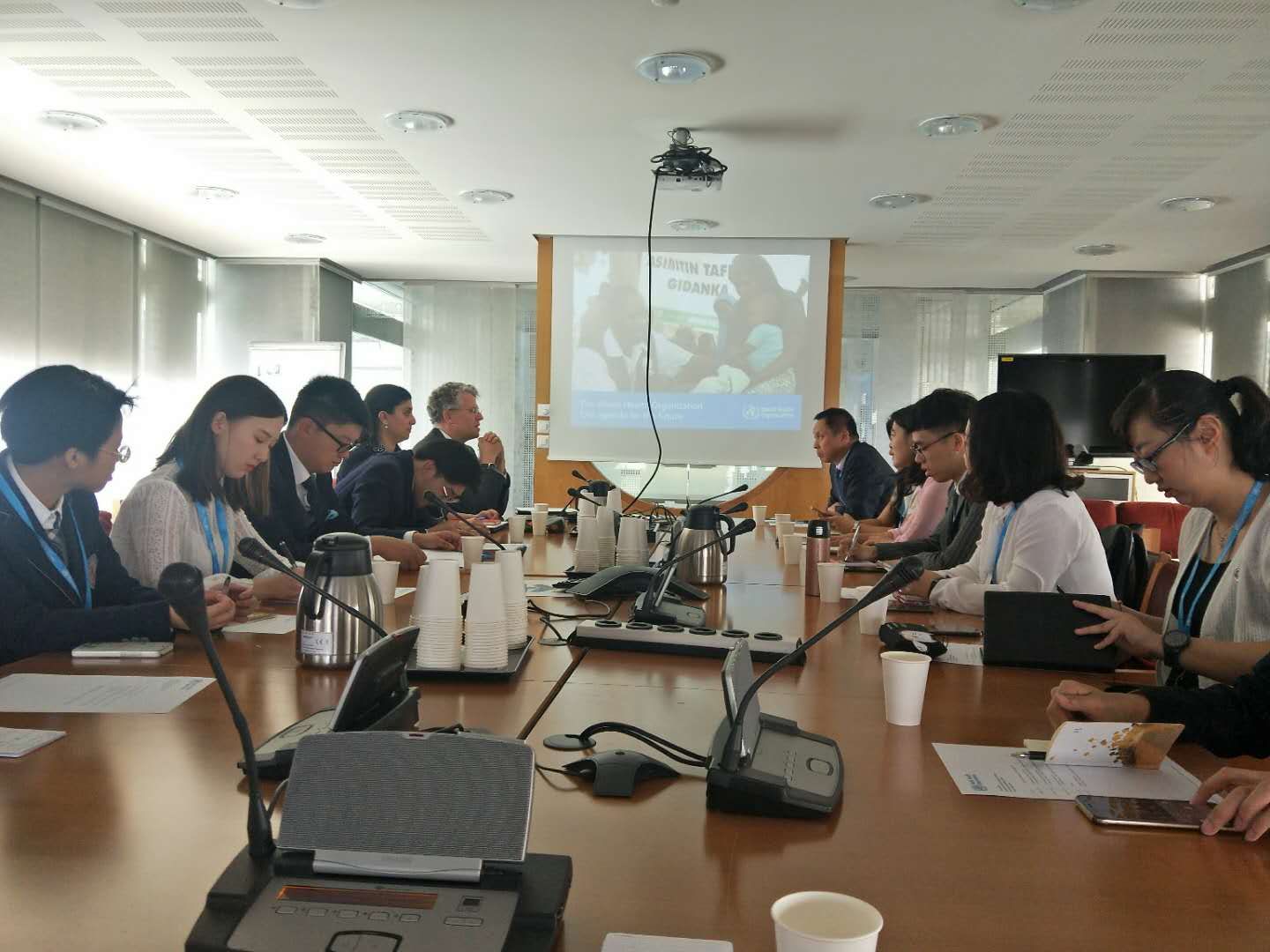The “Experience the U.N.” International Youth Delegation visits UNITAR and WHO
The delegation from the "Experience the United Nations" international youth exchange program, organized by Beijing Wu Jianmin Foundation (WJF), visited the UN Institute for Training and Research (UNITAR) on the morning of July 19, 2018. They met with Mr. Rabih El-Haddad, manager of the Multilateral Diplomacy Program and Mr. Julian Caletti who is in charge of China affairs at the UNITAR.

A group photo, with manager Rablin El-Haddad in the middle
Mr. Julian Caletti explained the background for the founding of the UNITAR and the current structure of the institute. He said that the goal of the institute is to train all kinds of UN staff, including diplomats and peacekeeping personnel and to equip them with strong communication capabilities and competencies. After the training, they will become highly qualified comprehensive talents and effective problem-solvers. The institute reformed its structure to better accommodate the sustainable development goals (SDGs) set by the United Nations. At the moment, the institute covers the four aspects of Peace, People, Planet and Prosperity, which fully match the 5P development framework raised by the UN.
Mr. Caletti also introduced the four categories of training, including Core Diplomatic Training, On-demand Courses and Events, and Free and Open Online Courses and Master’s Programmes. Most of the programs are related to multilateral diplomacy and cross-cultural exchange, which target the training on the nature and type of work, so as to produce an army of talents for the UN.
During the discussion, Mr. Caletti also talked about life and dreams. He told the students about his own experience of traveling around the world in the past ten days, his connection with China and why he chose to work for the UN. He asked the students about their dreams. When hearing the answers of “safeguarding world peace” and “becoming a world citizen,” he encouraged the students to dream big but also stay grounded. The work at the UN requires very high capabilities and character. He said that young people should work hard to accumulate different experiences and improve their overall capabilities before joining the UN. He also described the story of Mr. Sergio Vieira de Mello, who died in the Iraq war. He said that working for the UN is not just a nice-sounding job; the frontline workers have to risk their lives. He encouraged the students to go and see the frontline for themselves.

Discussion with Mr. Caletti at UNITAR
Mr. Rabih El-Haddad, Manager of Multilateral Diplomacy Program, also sat down with the students. He praised China’s contribution to supporting and promoting the multilateral free trade system. He said that China is taking the lead to promote multilateral diplomacy and trade against the backdrop of rising protectionism.
Mr. Rabih El-Haddad explained the challenges facing the UN and said candidly that the UN is not perfect. It is facing funding shortages, the global multilateral free trade system is facing obstacles, reform of the Security Council is not moving forward, and mankind keeps facing new crises. However, he encouraged the students to tackle the current and coming challenges.
He added that, although the UN is playing an important role in the world, many people really don’t understand the organization, and that the students should try to communicate the significance of the UN to the general public in different ways. When asked about the most desirable quality of a UN employee, Mr. El-Haddad said that a UN employee should try to improve his or her overall capabilities. An excellent diplomat should be able to create a good atmosphere of exchange and persuade people to reach consensus willingly. An excellent UN employee or diplomat should also focus on problem-solving and improving their own competitiveness.
The delegation visited World Health Organization (WHO) in the afternoon and held a roundtable with four experts.

In front of the WHO
Mr. Gaudenz Silberschmidt, Director for Partnerships and Non-State Actors Division of the WHO, welcomed the delegation and briefly introduced the history, operations and important resolutions of WHO. He also mentioned that China and Brazil were both founding members of WHO, and health-related negotiations started back in 1839. He pointed out that the central target of WHO’s thirteenth general program of work (2019-2023) is to achieve the goal of “three billions,” namely, ensuring healthy lives and promoting well-being for all at all ages by: Advancing universal health coverage – 1 billion more people benefitting from universal health coverage Addressing health emergencies – 1 billion more people better protected from health emergencies Promoting healthier populations – 1 billion more people enjoying better health and well-being.
Mr. Jun Xing, a medical officer at the WHO International Health Regulations, explained the drafting, implementation and significance of the regulations. He pointed out that the SARS outbreak in 2003 was one of the most important reasons why they developed the international health regulation, and all the countries signed the regulation to better cope with international health incidents because diseases spread at a very high speed in the 21st century. He also said that whether a public health incident was reported or not is not just a health issue but also a political and economic issue. When asked about the negotiation process with other countries during the drafting of the regulation, Mr. Xing said that he has participated in the process as a member of the Chinese delegation. He said that the game of nations is not only an important part but perhaps the most central part of the formulation of international health regulations, for it is the game of nations that can result in an international rule for every country to abide by.
Ms. Agnes Soucat, Director of Health Systems, Governance and Financing at WHO, explained the history, implementation and challenges of universal healthcare. The ultimate goal of universal healthcare is to ensure that everyone gets the healthcare they need, she said, adding that universal healthcare directly affects the health of the population. Access to healthcare makes people more productive and therefore able to contribute to social development. Protective measures against financial risks could also prevent against poverty due to cost of healthcare. Ms. Agnes pointed out that universal healthcare is a key component to sustainable development and poverty alleviation, as well as social justice. She emphasized that the WHO holds the belief that prevention is better than treatment, and expressed hope that a reliable universal healthcare system could be established soon.
Mr. Qi Zhang, traditional and complementary medicine coordinator at WHO, gave the last lecture of the day. He introduced the management system for traditional medicine under the WHO framework, including its establishment and specific contents. He mentioned that it was a breakthrough that traditional Chinese medicine (TCM) was officially included in the WHO system. It helps promote TCM and its remedies to the world. He emphasized that it is not only TCM that China promotes to the world, but also the traditional culture, which in turn helps improve China’s soft power.

Discussion with experts from WHO
The students were very active in communicating with officials from UNITAR and WHO. The experts were impressed with the students’ international perspective and their concern for issues facing mankind. They were also surprised to learn that the students were very knowledgeable about multilateral diplomacy, the UN and the rules of order. It was the first time that they received a delegation of young Chinese students. They said that they hoped the students could keep learning and improving and devote themselves to the work of the UN.



